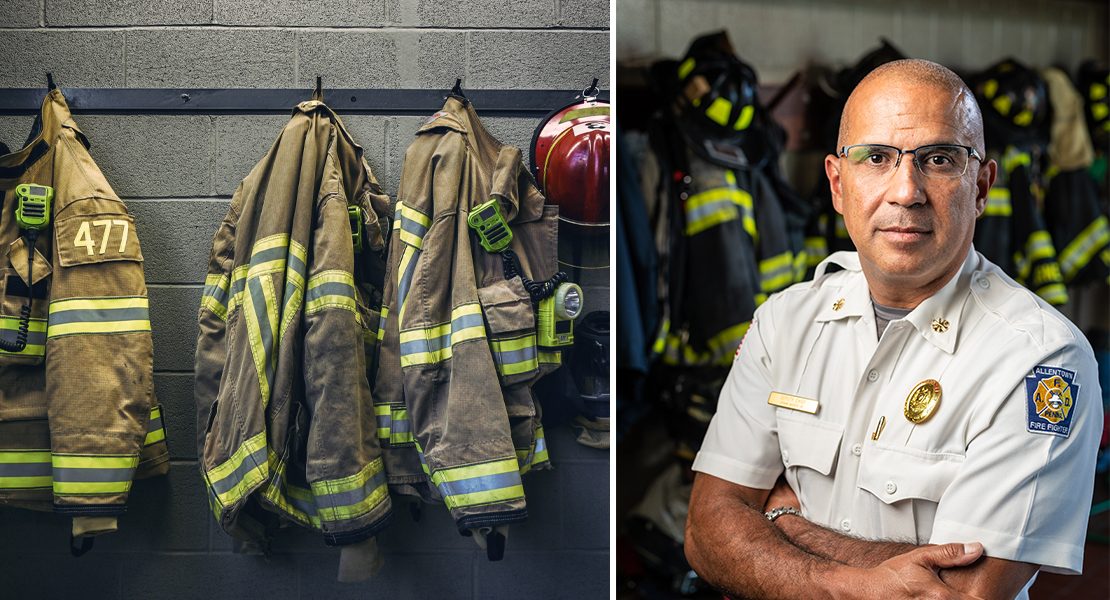Fire Prevention Month

Fire is an essential part of our lives. We use it for cooking, for heating, for industrial and scientific applications, for ambiance, even for many religious rites.
But fire can easily become assertive and dangerous. Take the Great Chicago Fire of 1871. In two days, it destroyed 3.3 square miles of the city at a cost of $222 million (about $4.6 billion today). That’s roughly equivalent to burning all of Northampton and half of Nazareth to the ground.
October is National Fire Prevention Month, so we spoke with Efrain Agosto, deputy fire chief of the city of Allentown, who provided some solid DIY advice for helping to save lives and property.
“One of your most important tools is the smoke detector,” he said. “It can provide an early warning of danger, giving you a better chance of responding properly to it—whether you’re able to deal with it yourself, or to get out and call 911,” he said.
But detector batteries can run down, so it’s good to replace them twice a year—for example, when changing from standard to daylight saving time (and back again). Replacing the entire detector every 10 years is another sound practice.
Don’t overlook fire extinguishers, either. Although the National Fire Prevention Association (NFPA) recognizes five classes of fire—each with its own ideal extinguisher—a good choice for home use is one rated “A-B-C.” That single unit is effective against:
CLASS A
burning materials such as wood, paper, and cloth
CLASS B
oil, gasoline, oil-based paints and stains
CLASS C
electrical fires in wiring, circuit breakers, fuse boxes, machinery and appliances
According to the NFPA, the primary cause of domestic fires and related injuries is careless cooking. “Never leave your food unattended,” Agosto said, “no matter how simple the meal. Even a microwave oven can create an environment for fire to start.” (Think about it—how many times have you punched in, say, 4:30, only to actually set it for 43:00?). Be especially careful if you re-use cooking oil. Each time you reheat it, the oil destabilizes a bit more, making it easier to reach its flash point.
Keeping your home neat and tidy will help, too.
“Many fires get out of hand because cluttered rooms provide plenty of fuel. And crowded rooms make it harder for you to escape and for firefighters to enter,” he said.
When you consider the number of appliances that run on electricity—computers, televisions, hair dryers, air conditioners, kitchen appliances—you’ll see how easy it can be to overload circuits. “Extension cords are designed for only temporary use,” Agosto said. “Power strips are good when they’re properly used, but I’ve seen cases where two strips were connected to each other, and every socket was full.” It’s also wise to be sure your home’s electrical panel is up to date.
Firefighting is a tough and risk-filled occupation. After all, they’re the ones that walk straight toward searing flames, thick smoke, and other hazards, risking everything. But did you know that those crews are trained and prepared to deal with other dangerous situations? “We get calls for all kinds of things,” Agosto said, “and the bulk of them require EMS assistance. Firefighters are also trained EMTs so, if we are first on the scene, we can administer some immediate medical treatment until the EMS squad arrives to take over.”
In addition to medical gear, the trucks carry spreaders, cutters, and rams to extract victims from crashed vehicles; airbags to help lift those vehicles, even a boat for water rescues. Fire departments also field specialized teams to deal with hazardous materials, bombs, technical rescues, even underwater recovery when needed. Not every station has its own set of specialists, Agosto added, but they can be gathered from various locations quickly.
Want to learn more about fire prevention, and how your local station operates? “Call your station and request a tour,” Agosto said. “They’ll be happy to set a day and time for a visit, whether it’s for a group or an individual.” Find the address and phone number for your neighborhood station at pafirefighters.com/directory.htm.














